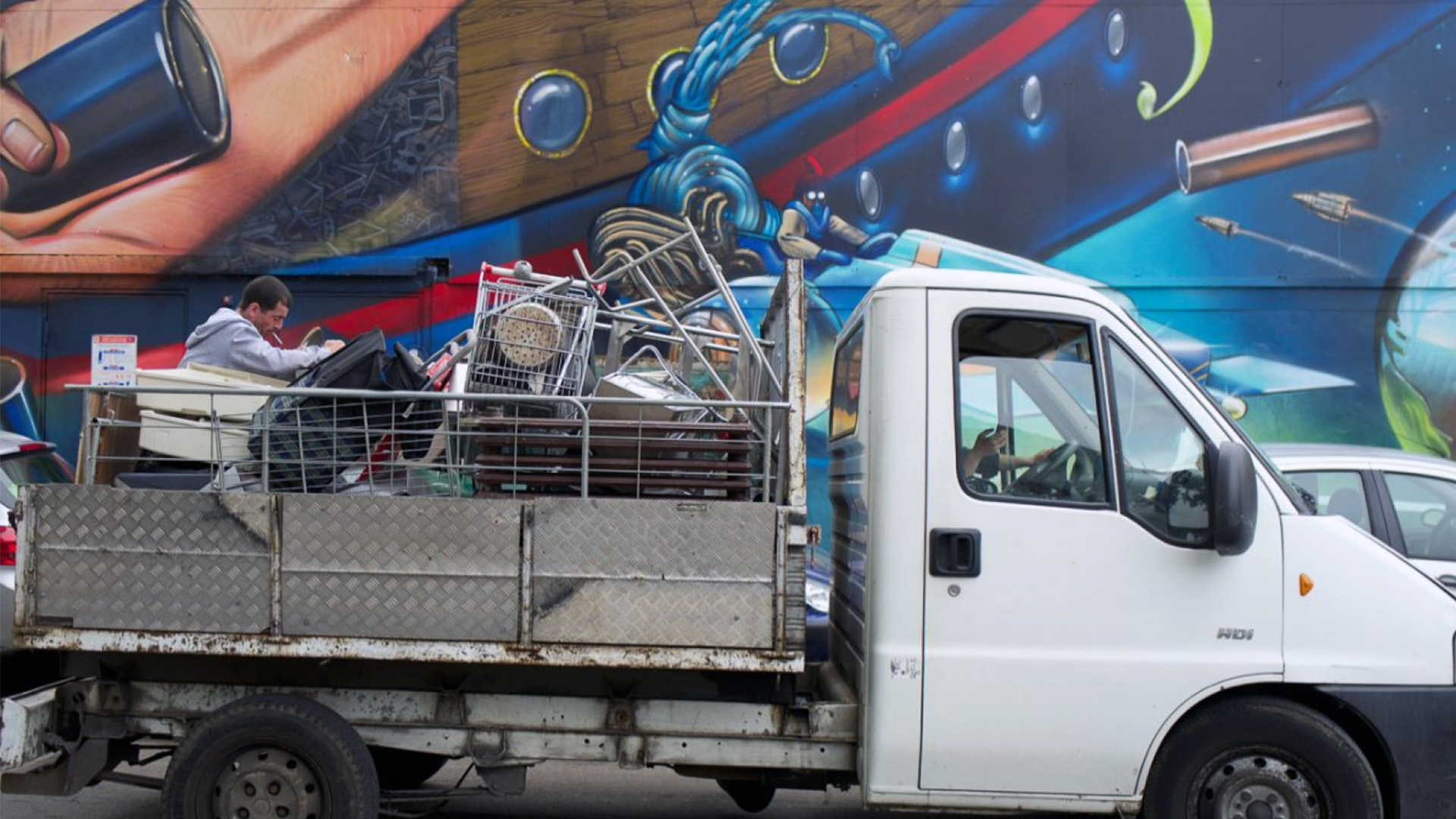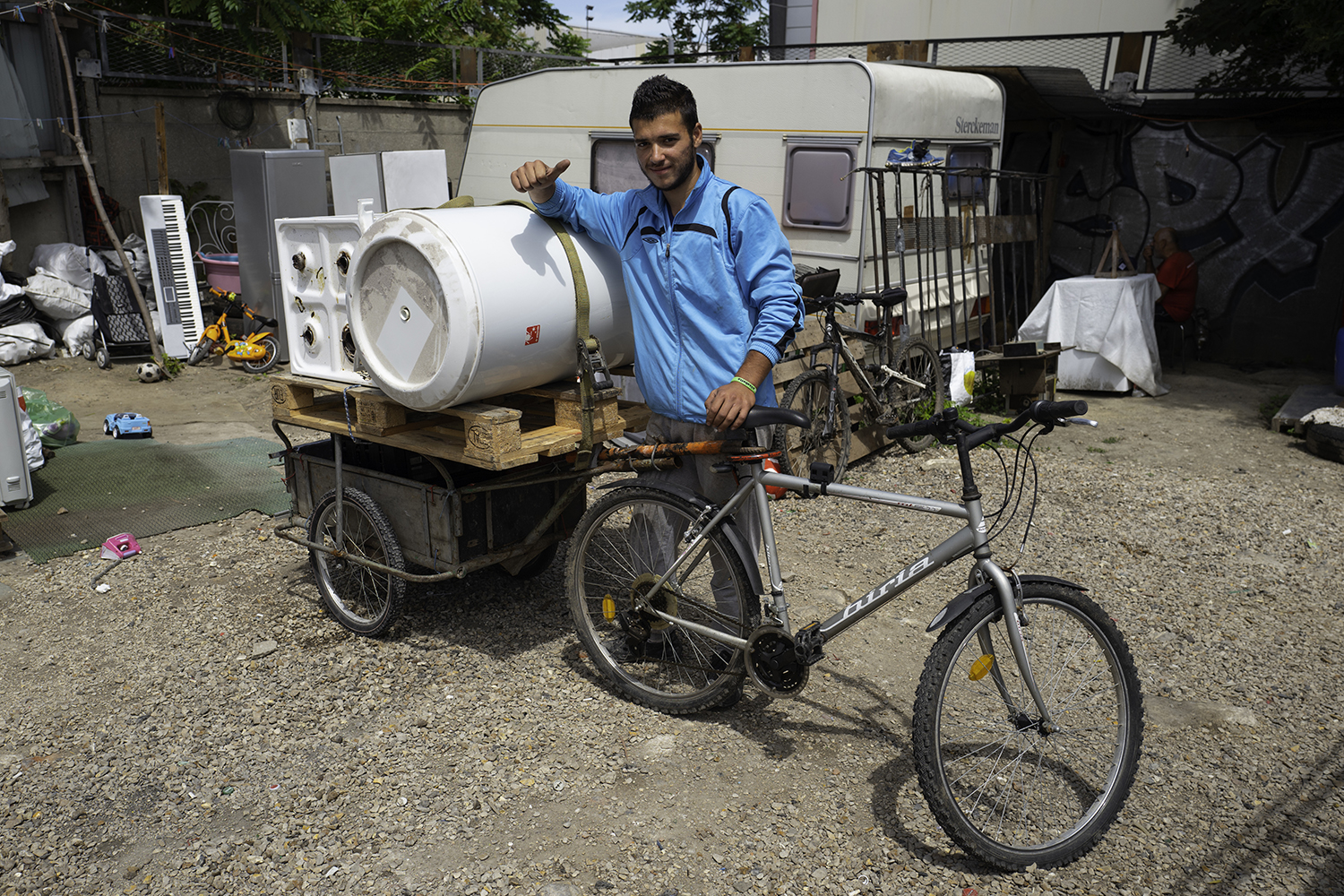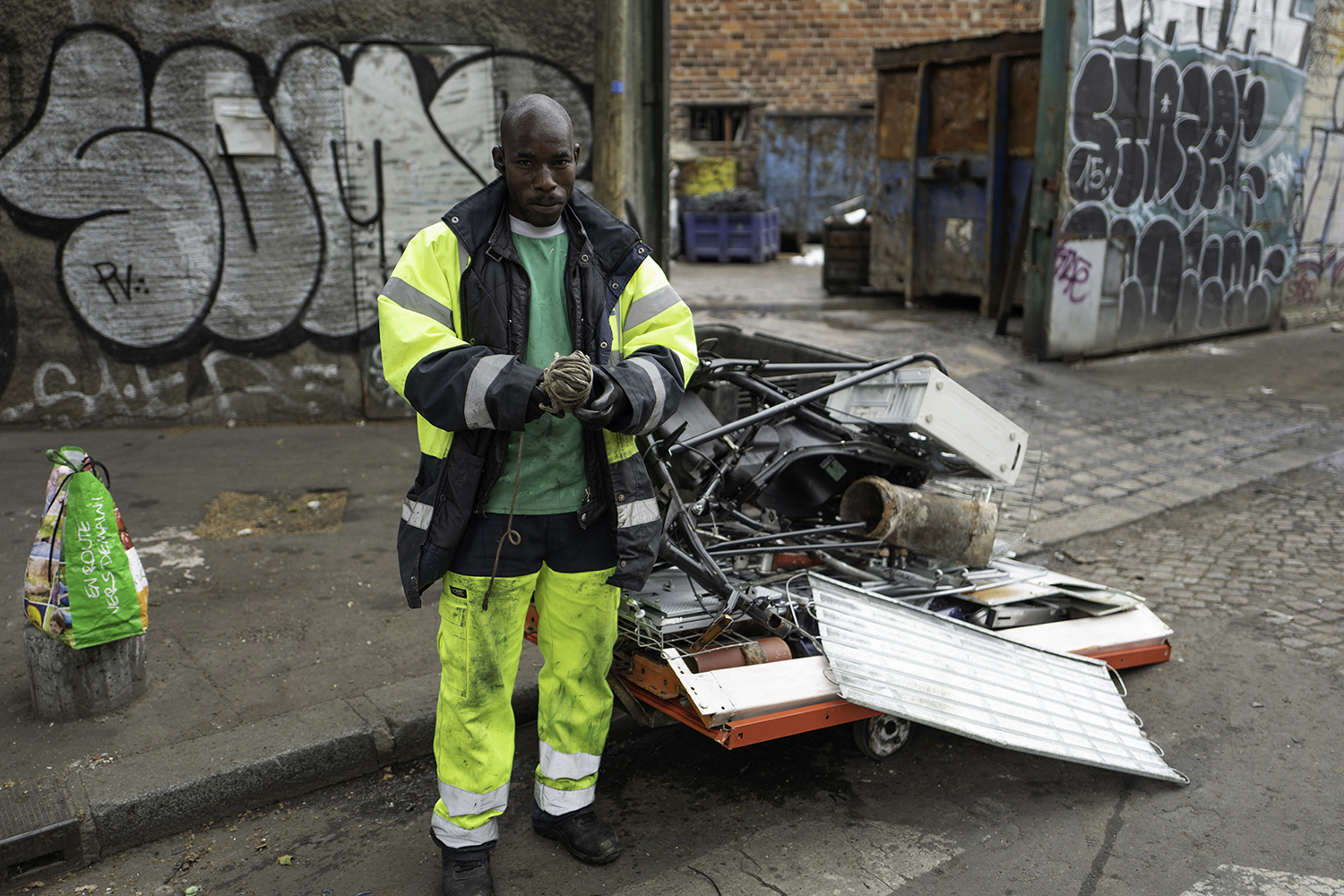Between tolerance and prohibition
Roma scrap metal collectors toiling outside Paris
Scrap metal collectors, working on the periphery of society, sustain the ground level operation of a lucrative global market. Facing exploitation and illegitimacy, their conditions have worsened since COVID-19.

A scrap metal collector in Aubervilliers clearly states that he is French. Previously, he had a construction job but was badly underpaid and began roaming the outskirts of Paris in search of metals to resell. Aubervilliers, June 2018. © Pascal Garret
‘I work collecting scrap metal from seven in the morning till eleven at night, nearly every day. I’ve got a list of all the dump sites in all the districts, and there’s always somebody on shift. You find stuff, even if it sometimes doesn’t make very much [. . .]. When you come back here, there’s a little space set aside for sorting and breaking it up, and this leads to problems with the neighbours. When you find a machine that works, that’s best because you can sell it on. Otherwise, you sell it to the scrap metal dealer [. . .]. There’s a lot of competition among the junk collectors; if you’re out collecting every day you can see everybody out there working their shift, all the time.’
Simon, a Romanian migrant who moved to Paris in 2009, was interviewed for a 2015-2019 National Research Agency (Agence Nationale de la Recherche, ANR) marginalization/inclusion study.1 His experience clearly shows that the collection, reconditioning and resale of recyclable materials and recovered junk are far from marginal activities. However, scrap metal collectors work in marginal urban spaces – shanty towns, empty or abandoned lots, squats and some rehousing sites – are themselves considered marginal by society and the authorities; collectors are commonly either undocumented migrants, Roma with unclear civic status (often confused with travellers) or economically disadvantaged French citizens.

Çiprian, a young Romanian, recovers junk using his bicycle and cargo trailer. All the families at this camp in Ivry-sur-Seine work in scrap metal collection, an activity authorized by the site’s managers. Some have vans or small trucks. Ivry-sur-Seine, Paris, June 2017. © Pascal Garret
Collecting scrap metal is evidently part of an economy of poverty that demands specific analysis. It is not the same as picking out trash from garbage cans. This is ‘work’ that has a productive value, which requires experience, tools, a means of transport – be it a shopping cart, small van or even customized cycle-trailer – and, above all, relational capital for those involved. Although ‘begging’ material and ‘ragpicking’ – the recovery of discarded objects – are indicative of a subsistence economy in which saving is impossible, scrap metal collection does allow the possibility of a future. Nevertheless, inaccessible formal employment rights and lack of alternative options keep these men and women in the scrap metal trade as Gary from Romania explains: ‘In France, there’s no work, less still for the Roma.’ His neighbour Mona adds: ‘What would I do without scrap metal? What do I do without it? Should I go out and steal or beg?’
A means of recycling
Activities associated with the scrap metal trade bring informal working practices into direct contact with formal economic structures, which are in turn linked to the global metals market and the recycling economy. Interviews carried out with representatives from ten large-scale scrap metal dealers located on the periphery of Paris indicate that 20-30 per cent of their raw material is supplied by collectors working in the informal sector, which, in turn, can account for up to 50 per cent of the wholesalers’s turnover largely due to the extraction of highly valuable non-ferrous metals, including copper and brass.
For large companies, the scrap metal economy is highly profitable and an integral part of international trade flows. Individual collectors, who gather, dismantle, sort and sell materials, play a hefty role in the increasingly lucrative waste product market, which currently operates off the back of this virtually free labour force beneficially disposing of urban junk. The term ‘perverse inclusion’, coined by Brazilian anthropologist Bader Sawaia, expresses the way these collectors, stigmatized in a variety of ways and excluded from the social system, remain essential to a flourishing global recycling industry with strong prospects for future growth. The contribution of collectors and they themselves are still an invisible yet essential part of a circular economy that would otherwise like to see itself as virtuous.
It bears repeating that collectors are never paid for the services they carry out (e.g., cleaning up a construction site) nor for the hours they spend gathering junk and then sorting and preparing usable materials. They are only paid for what they can sell and going rates can fluctuate wildly. In addition, ‘the collector is the adjustable variable in the system [and] the sector [. . .] transfers its costs onto the collection part of the process, which is very active when demand is high but kept on hold when it is not.’2 When prices are too low, collecting becomes unprofitable and simply stops.
Working as a family, the most adaptable can earn a total of 30 euros per day, a chunk of which often has to be given to intermediaries who handle sales with dealers or manage bank accounts. Some wholesalers do not hesitate to loosely weigh what has been collected and pay below the going rate; collectors are doubly discriminated against because they are both Roma and scrappers, always considered to be potentially offering illicit goods. The manager of one site on the outskirts of Paris owned by a multinational admits that: ‘Roma, the travellers, you don’t give them the best price because they block up the entrance and with them there’s more chance of bullshit; if they bring us sketchy stuff, we’re not interested and close the door on them. We use regular collectors – that way you know where your copper comes from. Okay, so we don’t look too closely where it comes from . . . or maybe we don’t tell them how good their stuff is and make a bigger margin.’ Such a conversation shows that collectors, whether Roma or otherwise, are not really considered or treated differently from one another. The small-scale scrap metal collectors met during the study do not belong to organized gangs that are accused of stealing copper. They do not have the means to participate in distributing goods to Belgium and Spain,3 a trade that will continue to operate until Europe manages to adopt common legislation that regulates the scrap metals sector. Suspicion normally falls on the seller of illicit goods rather than the buyer and so, in France, whereas it is illegal to burn electrical wiring out in the open to extract copper, nothing prevents companies from buying copper that has been ‘collected’ in this way.

Born in Mali, Sidiki illegally moved to France in 2014. Since then, he has walked many miles around Paris’s northern neighbourhoods, collecting all manner of metal objects every day to sell on to dealers. At the end of 2019, he finally received a residency permit. Aubervilliers, Paris, June 2016. © Pascal Garret
Between stigmatization and tolerance
Those who collect scrap metal and junk in public places are vulnerable. Police confiscate their cargo trailers. Relations with residents fluctuate between understanding, indifference and conflict. In these instances, discrimination against Roma and other marginalized workers tends to be more frequent. Sidiki, an undocumented Malian migrant, avoids police attention by wearing high-visibility clothing that provides him, paradoxically, with a degree of cover as he takes on the appearance of an official rubbish collector.
Recovering and storing scrap in residential sites provided by municipal authorities or non-profit organizations often conflicts with standard hygiene rules, creating issues with some site managers. There are those who argue that scrap collection should be reclassified under common employment law so that collectors can gain access to social housing, which currently requires applicants to be formally employed. This position is sometimes countered by the narrative that Roma prefer to remain ‘independent’, work ‘in freedom’ and reject formal, salaried work. However, our interviews reveal that the harsh existence and low income offered by scrap metal collecting result in many hoping for a job with a salary.
On other sites scrap metal collecting is tolerated and even supported by associations that recognize the abilities of collectors who know the city inside out, are determined to go out and cover great distances, are experienced in dealing with various invested parties and know how to handle various material, including dismantling or repairing machinery. Therefore, these associations advocate shared governance, which would enable scrap metal collectors to manage their resources, recognize their social role and open up the way to formal working rights rather than endorsing continued exclusion.
This point of view is clearly contrary to that of institutional actors. Municipal orders against ragpicking are increasing. For example, one such order has been issued in the La Madeleine borough of northern France, which has remarkably yet shrewdly been translated into Romanian and Bulgarian. Fines are imposed on those caught rummaging in trashcans (33 euro in Nanterre, within the western Parisian area of Hauts-de-Seine), small vans are banned from parking (as in Saint-Denis, in the northeastern Parisian area of Seine-Saint-Denis) and so on. In a similar vein, a 2013 report from the French Environment and Energy Management Agency (Agence de l’environnement et de la maîtrise de l’énergie, Ademe) suggests stopping the practice of leaving large items of household junk at the side of the public highway in order to limit the loss of resources and proposes contracting private firms to collect such materials, with a view to bringing the sector under control.
In general, public policy does not account for this first stage of the scrap metal economy. It is informal – indeed, illegal – and involves individuals perceived as poor, hard to monitor and undesirable, living beyond the rules. Since March 2020, the coronavirus effected lockdown has further impacted this sector, removing the options of informal scrap metal collectors, who have no right to claim compensation, support or indemnity. Against this background of heightened social and environmental pressures, has the time not come to change the paradigm for workers who collect waste material and play their part in the circular economy? The proposal advanced by economist Jean-Luc Dubois is pertinent: evaluate poverty not in terms of what people have or do not have, but in terms of what they do or do not do, and so recognize their capabilities.

This article was published in cooperation with CAIRN International Edition, translated and edited by Cadenza Academic Translations.
The study, which focused on the effects policies have on regulating foreign populations, including Roma migrants in Western European cities, was undertaken under Olivier Legros, University of Tours, France. Interviews initially focused on the economic integration methods of Romanian Roma practicing recovery. They were then extended to non-Roma waste pickers and scrap dealers in the Paris region. Interviews were also carried out with scrap metal dealers and a number of their Roma and non-Roma suppliers. The identity of people and sometimes places have been withheld to provide anonymity either at their express request or because their difficult administrative situation required it. All photos were all taken with the subject's consent.
C. Grollemund,‘L’inclusion sociale et professionnelle des gens du voyage dans la filière du recyclage des métaux’, a study commissioned by theAssociation for the Management of Traveler Reception and Accommodation in Puy-de- Dôme (Association de gestion du schéma d’accueil et d’habitat des gens du voyage du Puy-de- Dôme, AGSGV 63), 2018.
The 2011 French law that regulates the country’s scrap metal trade does not apply to its close European neighbours. Some scrap metal collectors from border regions are therefore encouraged to sell what become untraceable materials in Belgium, Germany, Spain or Italy for cash payments.
Published 14 July 2020
Original in French
Translated by
Cadenza Academic Translations
First published by Revue Projet, June 2020
Contributed by Revue Projet © Bénédicte Florin / Pascal Garret / Revue Projet / Eurozine
PDF/PRINTPublished in
In collaboration with
In focal points
Newsletter
Subscribe to know what’s worth thinking about.
Related Articles

Giorgia Meloni could become Italy’s first female prime minister. Her political rise is no isolated case: ‘femonationalism’ is flourishing throughout Europe, disguising extremes as the next socially acceptable, mainstream choice.

With the first round of French elections fast approaching, opinion polls suggest a close contest at the top. So how has Le Pen managed to overcome the impact of new far-right contender Zemmour? And what might this mean for Macron’s centrist politics and the future of the Left, including the Greens?






